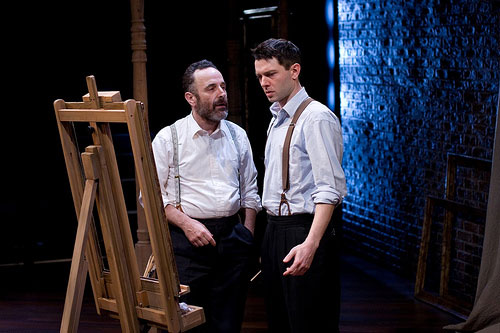Source: The Temple News
Date: February 3, 2009
Byline: Max McCormack
No sympathy for Asher Lev

It is always exciting when a new play premieres in our city. These works tend to be raw, daring and cutting-edge. The Arden Theatre Company's world-premiere production of My Name is Asher Lev is no exception, in spite of a few too many self-indulgent moments and run-on monologues.
My Name is Asher Lev is based on the best-selling novel by Chaim Potok. The novel details the life of a Brooklyn-born Hasidic boy with aspirations of becoming an artist. His strict Jewish upbringing and environment serve as obstacles to his artistic passion, confusing and bewildering the young man.
The play opens with Asher, as an adult, explaining that "Torah Jews do not become painters," that art is viewed by the Hasidim as sacrilege and foolishness.
The adolescent Asher, played by Karl Miller, must reconcile his faith with the love he has for making art.
In spite of clashes with his family (Asher is caught at the age of 10 copying images of nudes and a crucifixion), some of the adults in his life eventually realize he is gifted. He becomes a well-respected artist in the 1950s New York art scene but pays a personal price for his passion.
The 90-minute one-act play, adapted and directed by Aaron Posner, shows the turbulent relationship between parents and children and between religion and culture. The antipathy between Hasidic Judaism and contemporary culture is not often portrayed on the stage, making the play unique.
Adam Heller and Karl Miller star as Aryeh and Asher Lev in the Arden Theatre Company's production of My Name is Asher Lev (Courtesy Arden Theatre Company).
We see the struggle between what Asher calls his father's "aesthetic blindness" and what his father calls Asher's "moral blindness." But the dialogue and seemingly endless monologues, as performed by Miller, tend to drag the story down and leave the audience aching for more action.
Posner is one of the co-founders of the Arden and in 1999 co-adapted Potok's The Chosen.
"I respond deeply to the stories and worlds Chaim weaves so beautifully in his novels," Posner said, "and I am pleased and proud to be able to bring another one to a new audience in a new form."
Thankfully, Gabra Zackman and Adam Heller deliver commanding performances in My Name is Asher Lev. Zackman's portrayal of Asher's mother Rivkeh, a frail woman who is emotionally unstable for most of Asher's adult life, is haunting. As Asher's father, Aryeh, Heller is an enigmatic force, trying to instill the same faith in his son that he has sustained throughout his life. He also plays the rabbi and a famous artist who takes Asher under his wing.
In a coming-of-age story like this one, we need a title character with heroic qualities. But Miller's portrayal of Asher, or perhaps the lengthy monologues, failed to draw me in, and I felt less sympathy for Asher than Posner intended.
A spare set, made up of a few chairs and tables, craftsman-style pillars and a few large gold frames scattered on the thrust stage, reflects the solitude of Asher's journey and the innocence of his youth.
The flashes of gold throughout the set seem to speak of Asher's creative genius in an otherwise drab existence. The austere costumes accurately mirror the spare life of the Hasidic Judaism, traditional and colorless. In contrast, the costume of the Manhattan gallery owner is eclectic and bold.
Posner's direction of the play uses lots of symbolism, including blank canvases to represent Asher's artwork, leaving your imagination to do the rest. I imagined surrealism and Asher as an American Dali.
My Name is Asher Lev, which marks the 29th world premiere at the Arden, is a fascinating story that focuses on the trappings and peculiarities of a particular religion but can appeal to just about anyone. Its universal themes - family, youth, identity, religious tradition and dogma - will tug at your emotions.

